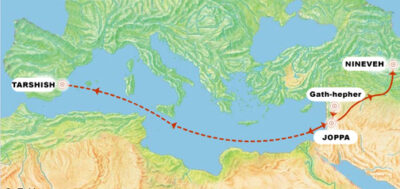Today’s first reading is from the Book of Jonah, one of my favorites. It is about our calling, our mission in life, our choices, and the unintended consequences for others.
The Lord called Jonah to go to preach repentance to the Assyrian capital city of Nineveh, the home of Israel’s most feared enemy. There was his mission laid before him by the Lord. But Jonah made ready to flee to Tarshish away from the LORD. He went down to Joppa, found a ship going to Tarshish. Why Tarshish? Take a look at the map. A picture is worth a thousand words.

Tarshish was the end of the known world. It was as far as away as he could get from his mission, from God, from the call to faithfulness. But the author has cast Jonah to represent the covenant people. In the construct of this account, the author is holding up a mirror to the people of Israel saying, “this is you!”
“It is too little, [the Lord] says, for you to be my servant, to raise up the tribes of Jacob, and restore the survivors of Israel; I will make you a light to the nations, that my salvation may reach to the ends of the earth.” (Isaiah 49:6)
It is as though God is saying to the covenant people: “And you have run away from your mission. You are not the light to the nations. You are inhibiting salvation reaching all people; you are sabotaging the divine plan. And it all started with you thinking that you know better than God. That thought became a choice, a decision to turn away from the mission. To turn away from your God.”
And we should all recall that we too are the covenant people. The same mirror is held up for us to see. Jonah’s choice is epic for all to see, but it was not the first choice he likely made that set him on this path. There were likely lots of small decisions. This was just the most notable and visible. It raises the question of what concatenation of choices is already in play in our lives? In what direction are we headed? Maybe we are not running; perhaps it is just a slow walk, but nonetheless away from God.
The author places this chain of events before us, this descent into the consequences of our choices. “He went down to Joppa, found a ship going to Tarshish, paid the fare, and went down in it to go with them to Tarshish, away from the LORD.” And this will not be the only time that Jonah is depicted going “down.” Each step, each choice along the way adds to the slow descent into darkness, away from the mission to be a light to the nations.
I wonder if he considers the moral consequences of what he likely believes is just a personal choice. His personal choice leaves in place the wrecking ball of evil that is Assyria and Nineveh. He could choose to fulfill his mission and either (a) they are destroyed or (b) they repent. Either way the “wrecking ball” is out of action. But he is too self-centered, selfish to potentially sacrifice himself for the others, for the mission. It is when people say Jonah represents a type of Christ as he waits in the belly of the whale, I have to just shake my head. Jonah is, in a way, an anti-Christ; not the One who willingly gave up his life, that we all might live. Just the opposite. He chooses his life.
Jonah’s choice is personal, but the consequences are communal. There is no morally wrong choice that has no other victims. What happens in Vegas never stays in Vegas, it always eventually makes its way home.
Jonah’s choice will have dire consequences for others. Our choices have consequences for others. This is also part of the amazing narrative of Jonah that the author wants us to understand.
Image credit: Jonah and the Whale, Folio from a Jami al-Tavarikh (Compendium of Chronicles), Metropolitan Museum of Art | PD-US